Past Naval War College Presidents
From the time of its founder and first president, Rear Admiral Steven B. Luce in 1884, the U.S. Naval War College has been capably led to excel as the U.S. Navy's "Home of Thought." The vision and efforts of its storied presidents have ensured the college's place at the forefront of educating leaders, defining the future Navy, and informing decision making at the highest levels of government.
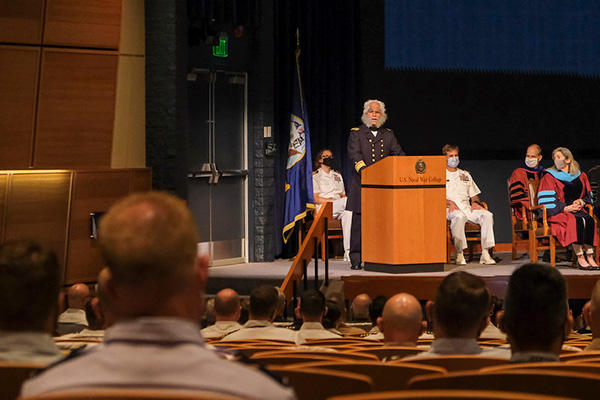
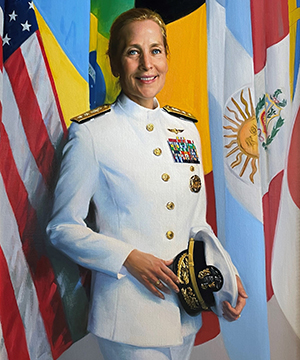
Shoshana S. Chatfield
Rear Adm.
In 2019, Admiral Chatfield was appointed the 57th President of the Naval War College, becoming the first woman to hold this position. Upon arrival, she emphasized the importance of diversity, equity and inclusion and increased confidence in the culture of respect and collaboration within the institution. She led the College during a time of extraordinary challenges stemming from the COVID-19 pandemic. Chatfield oversaw the successful transition of the college’s education and research programs to virtual and hybrid formats. For these efforts, the College received the Meritorious Unit Citation.
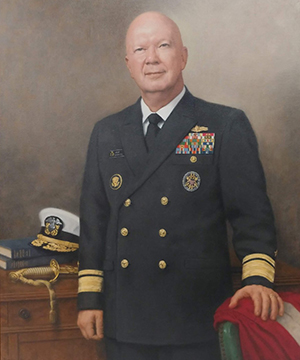
Jeffrey A. Harley
Rear Adm.
During Rear Admiral Harley’s tenure as 56th president of the Naval War College, he sought to “operationalize, navalize, futurize, and internationalize” the College. This was achieved in part by creating a Cyber and Innovation Policy Institute. He also established the John B. Hattendorf Center for Maritime Historical Research to ground the college in history as well as a College of Leadership and Ethics to emphasize leadership principles. In the international arena, he established the International Maritime Staff Officers Course and created a program to allow international students to earn a master’s degree.
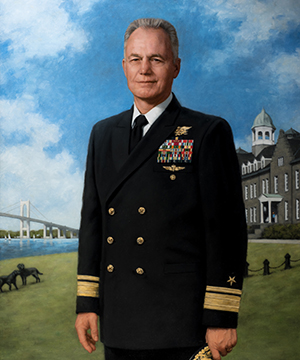
P. Gardner Howe III
Rear Adm.
As the 55th President of the U.S. Naval War College, Rear Admiral Howe was the first U.S. Navy SEAL to hold that office. Under his leadership, the college focused its efforts on preparing leaders for the challenges of an increasingly complex operational environment and the rise of nearpeer competitors. These efforts included reinvigorating a sense of the profession and leading the Navy's initiatives to improve leader development.
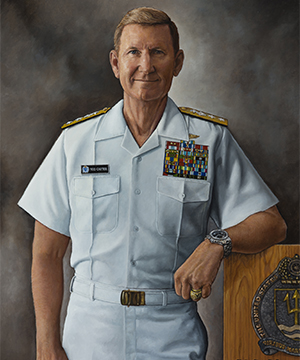
Walter E. “Ted” Carter, Jr.
Rear Adm.
54th President of the U.S. Naval War College, Rear Admiral Carter effectively led the college through an unprecedented period of fleet interaction and international engagement. Perceiving the need to create a cadre of U.S. Navy strategists, he led the efforts to establish the Advanced Studies in Naval Strategy Program. Designated by the Chief of Naval Operations to oversee all leadership and ethics training throughout the Navy, he presented a watershed white paper entitled “Ethics in the Navy” that became the cornerstone for ethical discussions within the Navy and the joint force. He subsequently established the Naval Leadership and Ethics Center in Newport, Rhode Island.
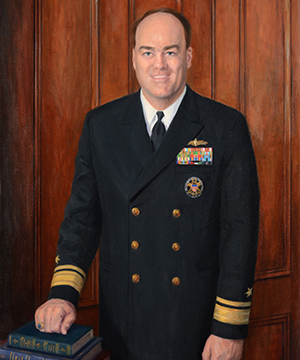
John N. Christenson
Rear Adm.
A U.S. Navy surface warfare officer, Rear Admiral Christenson was President, Board of Inspection and Survey, before becoming the 53rd President of the U.S. Naval War College. As president of the Naval War College, Admiral Christenson stimulated War College innovation, broke new ground in Navy leader education, expanded international outreach and increased support to fleet operational-level training through his promotion of faculty research and war-gaming. The college provided hands-on assistance to fleet staffs in venues such as the Fleet Synchronization Conference, Current Strategy Forum, Leader Development Strategy and the International Seapower Symposium.
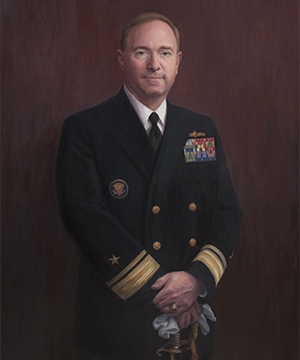
James P. Wisecup
Rear Adm.
A U.S. Navy surface warfare officer, Rear Admiral Wisecup was Commander, Carrier Strike Group 7 (USS Ronald Reagan Strike Group), immediately before becoming the 52nd President of the U.S. Naval War College. As president of the Naval War College, Admiral Wisecup oversaw the continuing growth of the college, inaugurated the Chinese language library for the college’s China Maritime Studies Institute, and hosted two highly successful Current Strategy Fora as well as the nineteenth International Seapower Symposium. His administration saw increased cooperation and support from the Naval War College Foundation with substantial growth in its membership.
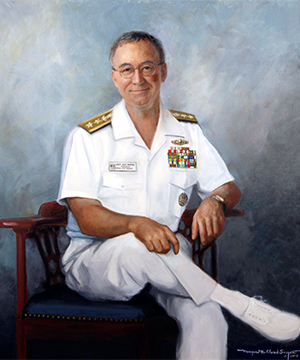
Jacob L. Shuford
Rear Adm.
Rear Admiral Jacob Shuford, the fifty-first president of the U.S. Naval War College, led the college through an unprecedented period of mission growth, program expansion, and increased international engagement. He directed an extensive restructuring of the basic curriculum, and created and implemented the flag-level Joint Force Maritime Component Commander course, the Maritime Staff Operators course, and a re-chartered Operational Planner Course. At the strategic level, under his direction, the college played the key role in designing the overall process for the nation’s maritime strategy as well as planning and executing the geostrategic analysis that supported it.
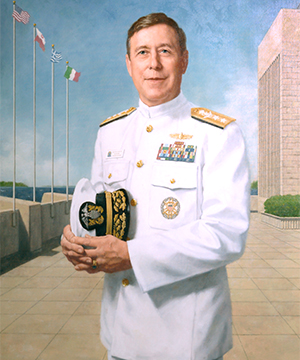
Ronald A. Route
Rear Adm.
Reporting to the U.S. Naval War College from duty as Commander, Navy Warfare Development Command, Rear Admiral Route accelerated the advantages that the Naval War College brought to the U.S. Navy and the nation by sharpening the college’s focus on mission and relevance. Under his leadership, the college successfully addressed key operational challenges of significant concern to the Navy through an aggressive program of research, analysis and war gaming. These efforts included establishing an advanced research program for selected students—the Halsey Scholars—collaborating with Navy experts in areas such as ballistic missile defense and theater antisubmarine challenges.
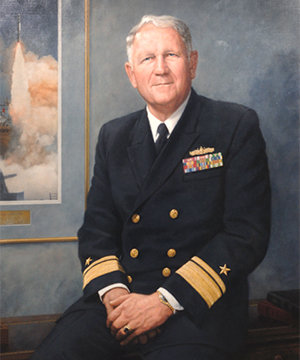
Rodney P. Rempt
Rear Adm.
Taking command as the forty-ninth president of the U.S. Naval War College only twenty days before the terrorist attack of 11 September 2001, Rear Admiral Rempt immediately refocused the college and its intellectual resources on the new imminent threats to the nation. Under his leadership, the college provided an illuminating series of point papers to the nation’s top military and civilian leaders and initiated innovative homeland security games with participants from key local, state, and federal agencies. During his tenure, Admiral Rempt completed a wide-ranging review of the U.S. Navy’s graduate and professional education policy that resulted in significant changes and improvements.
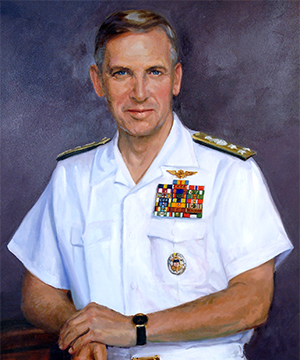
Arthur K. Cebrowski
Vice Adm.
Arthur K. Cebrowski (1942 – 2006) was a member of the first CNO Strategic Studies Group at the U.S. Naval War College in 1981. Before becoming the college’s forty-eighth president, he had previously served as Director, Navy Space, Information Warfare, Command and Control (N6). As college president, he introduced network-centric warfare, the theory of war for the information age, to the college’s curriculum and research, created an information-age war-fighting environment for war gaming and brought the Navy Warfare Development Command to fruition. He also introduced the concept of transformation to the college, making the Naval War College complex a change agent for the U.S. Navy leadership.
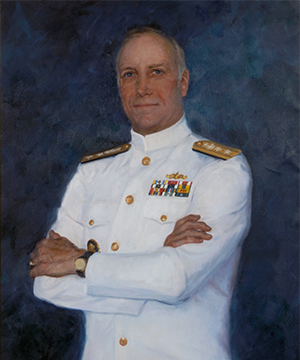
James R. Stark
Rear Adm.
The administration of Rear Admiral Stark as the forty-seventh president of the U.S. Naval War College witnessed the reorganization of the curriculum of the College of Continuing Education so that officers could complete the course in a single shore tour. Stark also oversaw the design and building of McCarty Little Hall, initiated long-term planning for a new library and administration building and effected the incorporation of the Naval Warfare Development Center into college operations.
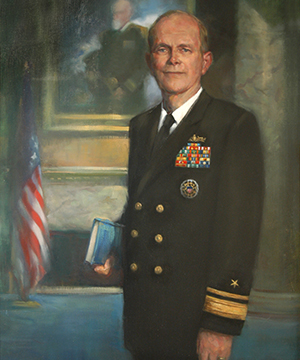
Joseph C. Strasser
Rear Adm.
As the forty-sixth president, Rear Admiral Strasser occupied the presidency for five years, longer than any other president in the history of the U.S. Naval War College. His tour was highlighted by accreditation of the college by the New England Association of Schools and Colleges for the award of a Master’s degree in National Security and Strategic Studies. Admiral Strasser was president of the college at the time of the fall of the Berlin Wall, the dissolution of the Warsaw Pact, and the end of the Cold War.
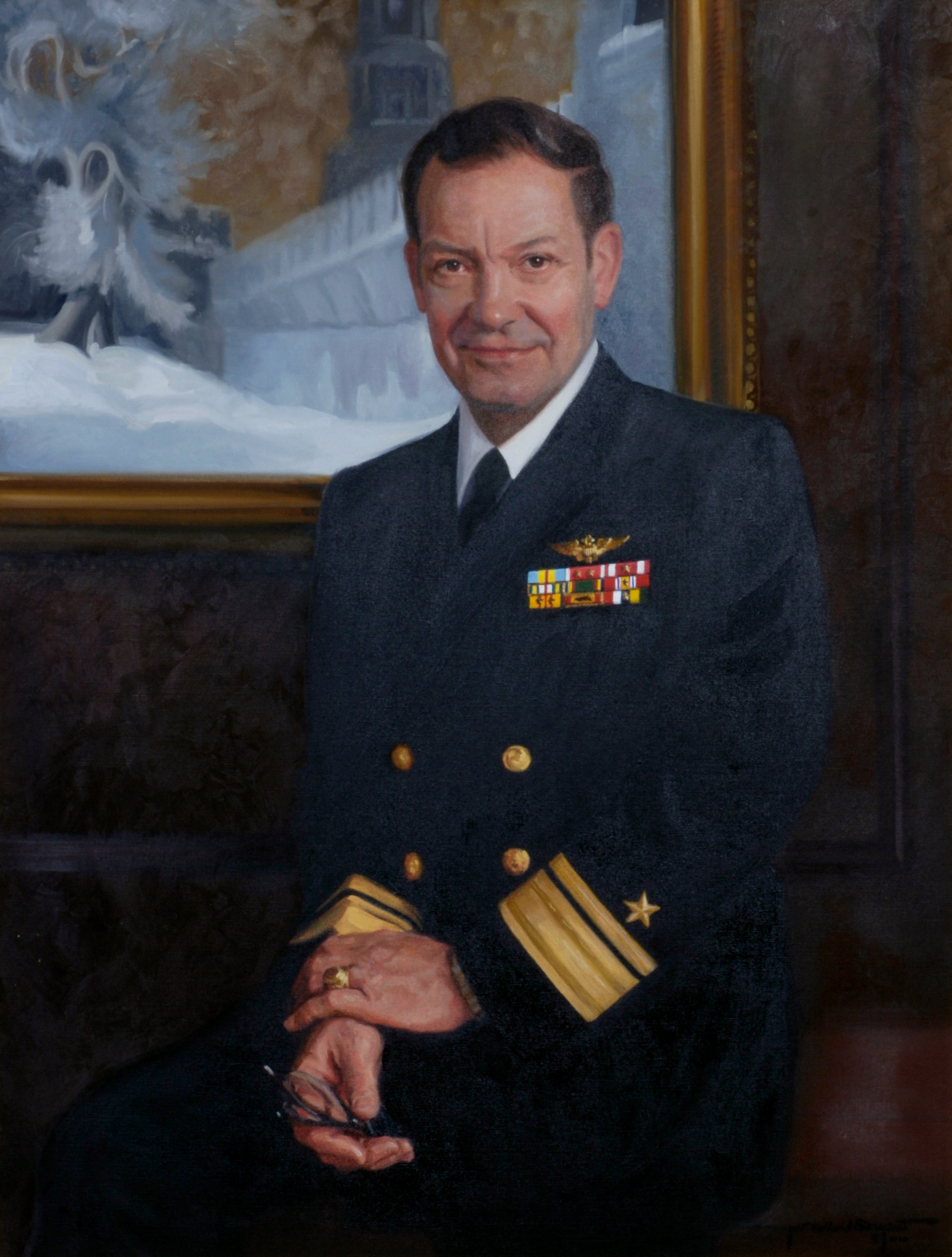
Ronald J. Kurth
Rear Adm.
Ronald J. Kurth taught Russian at the U.S. Naval Academy, and earned a Master of Arts degree in Public Administration and a Ph.D. in Russian studies at Harvard University. As the forty-fifth president of the U.S. Naval War College, Rear Admiral Kurth testified before Congress concerning Professional Military Education and the application of the Goldwater-Nichols legislation, conceived the idea that led to the accreditation of the Naval War College to award a Master of Arts degree, and began the long-term effort to construct a new building.
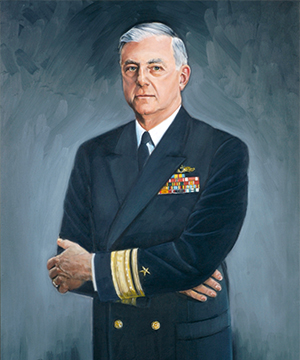
John A. Baldwin, Jr.
Rear Adm.
Before taking up his role as president, U.S. Naval War College, John A. Baldwin, Jr., had served in the Office of the Secretary of the Navy as Deputy Director of the Office of Program Appraisal and Director of the Systems Analysis Division in the Office of the Chief of Naval Operations. As the college's forty-fourth president, Rear Admiral Baldwin initiated the process that eventually led to the accreditation of the college for the granting of master’s degrees that would occur officially in 1991. He also established an Institute for Strategic Studies to facilitate the accreditation process and to serve as a device to secure and retain quality faculty.
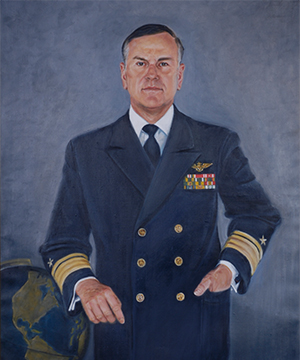
Ronald F. Marryott
Rear Adm.
Ronald F. Marryott (1934 – 2005) was a U.S. Navy aviator who in the mid-1960s taught naval history and the history of U.S. foreign policy, American government and politics, and international relations at the U.S. Naval Academy. As the forty-third president of the Naval War College, he promoted the college’s role in formulating strategic ideas and refining concepts. On leaving the Naval War College, he was appointed Superintendent of the Naval Academy from 1986 to 1988. After his retirement from active duty in 1990, he became president and chief executive officer of the George C. Marshall Foundation, and then, president and chief executive of the Naval Academy Alumni Association, 1996 – 2000.
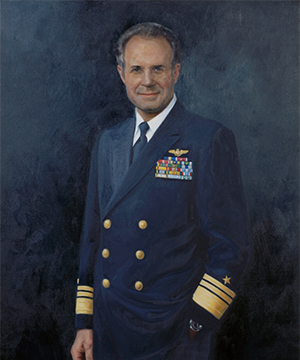
James E. Service
Vice Adm.
A naval aviator and test pilot, James E. Service had flown combat missions in both the Korean and Vietnam wars. A graduate of the U.S. Army War College, he had served as Commander, Battle Force, Sixth Fleet, and had been in that position when F-14 fighters from his battle force had shot down two Libyan aircraft during operations in the Gulf of Sidra. As the forty-second president of the U.S. Naval War College, Vice Admiral Service presided over the college’s centenary in 1984, which was marked with the reopening of an enlarged museum in Founders Hall, after a two-year renovation program, and the publication of Sailors and Scholars, a history of the institution’s first one hundred years.
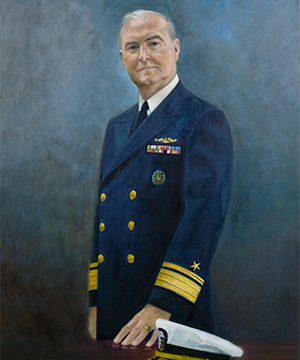
Edward F. Welch, Jr.
Rear Adm.
Born in Barrington, Rhode Island, Edward F. Welch (1925 – 2008) was a graduate of the National War College and former dean of academic affairs at that institution. From 1977 to 1979, he was deputy director of international negotiations on the Joint Staff with responsibility to the Joint Chiefs of Staff for arms control talks. As forty-first president of the U.S. Naval War College, he emphasized fleet operations in the curriculum and in war gaming. It was during his administration that global war gaming was begun. Welch also instituted a program, with the approval of the Chief of Naval Operations, for naval officer students to work for master’s degrees with area colleges and universities.
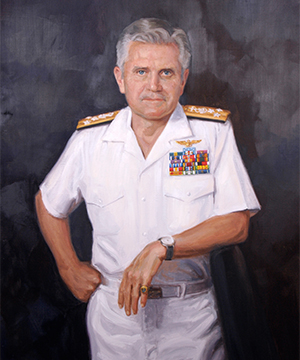
James B. Stockdale
Vice Adm.
In 1965, James Bond Stockdale (1923 – 2005), commander of Carrier Air Wing 16, was shot down and taken prisoner in North Vietnam. Upon his release nearly eight years later, Stockdale was promoted to rear admiral and awarded the Medal of Honor for the valor and heroism of his leadership while the senior officer in prison camp. As the fortieth president of the U.S. Naval War College, Stockdale expanded the electives program to include courses on a wide variety of topics, some of which related indirectly or not at all to naval warfare and cognate themes. Stockdale taught, with Professor Joseph Brennan, a course on military ethics inspired by his own experiences as a prisoner of war.
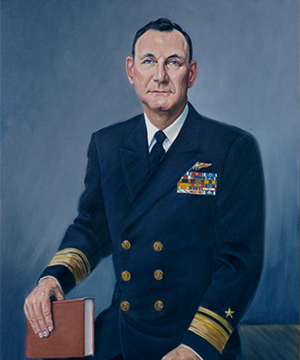
Huntington Hardisty
Rear Adm.
Huntington Hardisty (1929 – 2003) had been a U.S. Navy captain and the Dean of Academics under Vice Admiral Julien J. Le Bourgeois, 1976 – 1977. As a newly promoted flag officer, he succeeded Le Bourgeois in April 1977 as the U.S. Naval War College’s thirty-ninth president. His six-month tour is the shortest of all and characterized by a conscientious application to carrying on academic programs inaugurated by his predecessor. He later went on to serve as a four-star admiral as Vice Chief of Naval Operations, 1987 – 1988, and Commander in Chief, United States Pacific Command, 1988 – 1991.
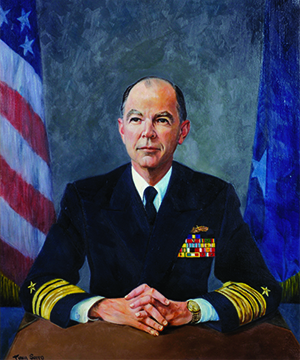
Julien J. Le Bourgeois
Vice Adm.
The focus of the administration of Vice Admiral Julien J. Le Bourgeois was the consolidation and refinement of the radical
changes in curriculum and organization that had been made during the previous administration. Admiral Le Bourgeois also initiated action with the Navy Department leading to the creation of a Center for Advanced Research in 1980. Noteworthy, too, was a project initiated in 1976 for a museum of naval warfare and the U.S. Navy’s regional history in the U.S. Naval War College’s original home, Founders Hall. The building had been Naval Station headquarters until 1974, when it reverted to the College.
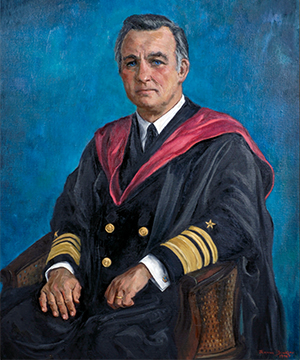
Stansfield Turner
Vice Adm.
Stansfield Turner (b. 1923) became a Rhodes Scholar at Oxford University after graduating from the U.S. Naval Academy. In 1972, the Chief of Naval Operations, Admiral Elmo Zumwalt, a 1953 U.S. Naval War College graduate, sent Turner to Newport with a mission to radically change the college, providing it with a rigorous and challenging curriculum that would broaden officers’ outlooks beyond their narrow specialties and to give them the education to analyze problems effectively. In doing this, Turner built on his educational experiences and connections at Oxford to create the three-course curriculum that has existed since that time.
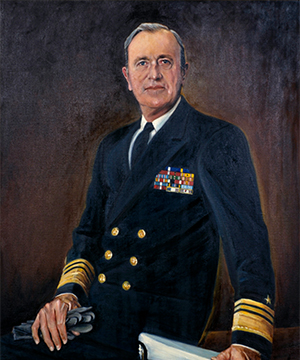
Benedict J. Semmes, Jr.
Vice Adm.
Vice Admiral Benedict J. Semmes, Jr., came to the presidency of the U.S. Naval War College with thirteen years experience as a flag officer and many years in top-level Navy Department administration, having served as Chief of the Bureau of Naval Personnel and Commander, Second Fleet. He was no stranger to Newport, having served as commander of the Cruiser-Destroyer Force, Atlantic, 1963 – 1964, and during that time he lectured on more than one occasion at the Naval War College. During his tour as the College’s thirty-sixth president, the College shifted its emphasis away from foreign and international affairs to management concepts in keeping with the prevailing notions in Washington.
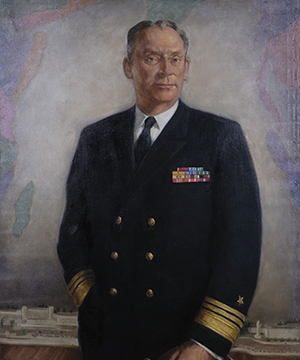
Richard G. Colbert
Vice Adm.
Richard Gary Colbert (1915 – 1973) graduated from the U.S. Naval War College in 1956. Staying on, he became the first director of the new senior foreign officers’ course, eventually named the Naval Command College, that began in 1956 and had its first graduates in 1957. As the college’s thirty-fifth president, he consolidated and strengthened the academic programs initiated by his predecessor, and he set in motion the construction program for Spruance, Conolly, and Hewitt Halls. Colbert also laid the groundwork for the Naval Staff College course for intermediate-level international officers, established the Naval War College Foundation, and instituted the International Seapower Symposia.
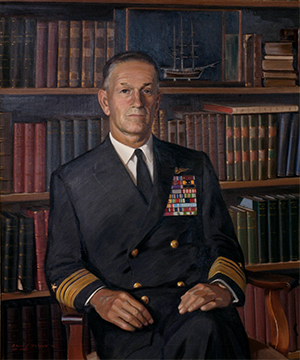
John T. Hayward
Vice Adm.
A high school dropout and a batboy for the New York Yankees, Vice Admiral John T. Hayward (1908 – 1999) began his naval career in May 1925 as a recruit at the Newport Naval Training Station. As the thirty-fourth U.S. Naval War College president, he introduced a dynamic program to make over the U.S. Navy’s highest professional school along the lines of civilian colleges. The focus on professional curriculum, student requirements, and faculty was also complemented by a program for appropriate facilities that would ultimately lead to the construction of Spruance, Conolly, and Hewitt Halls during the 1970s.
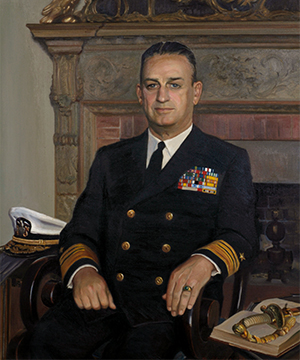
Charles L. Melson
Vice Adm.
Vice Admiral Charles LeRoy Melson (1904 – 1981) graduated from the U.S. Naval War College in 1948 and served on the staff the following year. As the thirty-third president, Melson supported greater emphasis on basic naval subjects, and he expanded the use of the Naval Electronic Warfare Simulator (NEWS) for the use of war gaming in both the senior and junior courses. It was during his term also that an addition was made to Mahan Hall for an expanded library collection. Before coming to the presidency of the Naval War College, he was Superintendent of the U.S. Naval Academy, 1958 – 1960; Commander, First Fleet, 1960 – 1962; and Commander, Taiwan Defense Command, 1962 – 1964.
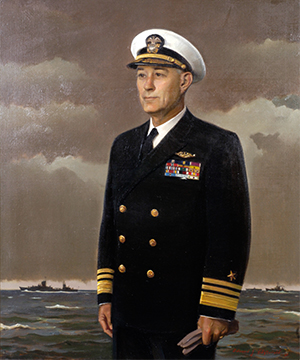
Bernard L. Austin
Vice Adm.
Vice Admiral Bernard Lige Austin (1902 – 1967), the U.S. Naval War College’s thirty-second president, remained in office for four years, the longest tour in college history up to that time. Austin came to the college with impeccable credentials in naval warfare. In the Second World War he served as a destroyer captain and squadron commander and sailed with Arleigh Burke’s “Little Beaver” squadron in the Solomon Islands campaign. Subsequently, he joined the staff of Admiral Chester W. Nimitz, Commander, Pacific Fleet, becoming the youngest flag officer in the U.S. Navy when he was spot-promoted to commodore.
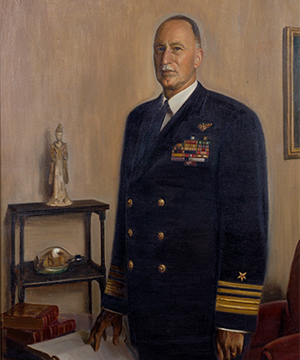
Stuart H. Ingersoll
Vice Adm.
Vice Admiral Stuart H. Ingersoll (d. 1983) became the thirty-first president of the U.S. Naval War College in August 1957. In 1944, he had commanded the carrier USS Monterey (CVL 26) in the Leyte campaign and through “Halsey’s Typhoon.” When he came to the college, he had served for twelve years as a flag officer and commanded both the Sixth and Seventh Fleets. He brought to the college a broad background in planning and leadership in postwar unified commands. It was during Ingersoll’s administration that war gaming at the college made a significant change from a manual procedure to computerization.
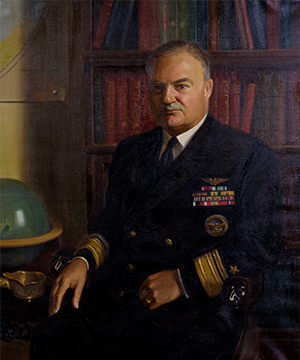
Thomas H. Robbins
Rear Adm.
Thomas Hinkley Robbins (1900 – 1972) had many years of service with the U.S. Naval War College before becoming the thirtieth president in September 1956. He was a member of the graduating class of 1937, served on the staff 1938 – 1939, was acting president during 1953 – 1954 and chief of staff in 1955 and 1956. Robbins inaugurated the senior foreign officer course, later the Naval Command College, in 1956 and when he left the college in August of the following year, he became Commandant of the Potomac River Naval Command—making him the first president since the Second World War who did not immediately leave active service.
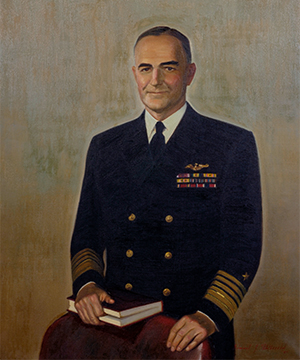
Lynde D. McCormick
Vice Adm.
Lynde Dupuy McCormick (1895 – 1956) graduated from the U.S. Naval War College in 1938 and went on to a very distinguished career, serving for a time as Vice Chief of Naval Operations (1949) and Acting Chief of Naval Operations (1951). Promoted to four stars in 1950, he served as Commander in Chief, Atlantic Fleet and Atlantic Command—in which position he became the first Supreme Allied Commander, Atlantic. On becoming the twenty-ninth president of the Naval War College, he reverted to three-star rank. In 1956, during the second year of his presidency, Admiral McCormick took the initiative to establish a new course for senior officers from other navies, the present-day Naval Command College.
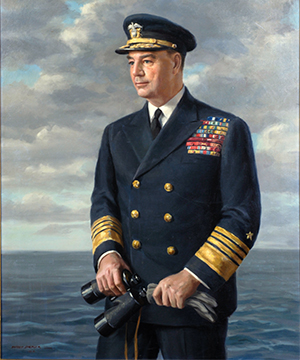
Richard L. Conolly
Vice Adm.
In World War One, Conolly earned the Navy Cross when his ship, the transport USS Westerbridge, was torpedoed in 1918. As a lieutenant commander, Richard Lansing Conolly (1892 – 1962) graduated from the U.S. Naval War College in 1931 and then went on for a year to teach strategy and tactics on the college’s faculty. In 1942 – 1943, Conolly was assistant planning officer on the staff of Admiral Ernest J. King and planned the invasion of Guadalcanal and North Africa. In 1943, he served as Commander of Landing Craft and Bases during the invasions of North Africa and Italy, then commanded the Amphibious Assault Group at Kwajalein in 1944.
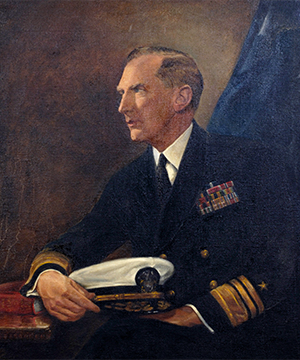
Donald B. Beary
Vice Adm.
Donald B. Beary (1888 – 1966) was awarded the Navy Cross for convoy duty in World War One. When the United States entered World War Two in 1941, Beary commanded the Fleet Operational Training Command, Atlantic. Later, during the battles of Iwo Jima and Okinawa in 1944, he was serving as Commander, Service Squadron 6, and was assigned the task of providing at-sea support to the Third and Fifth Fleets. At the U.S. Naval War College, Vice Admiral Beary undertook to broaden the students’ views by bringing to Newport a wide variety of business authorities and leaders to meet and have discussions with students.
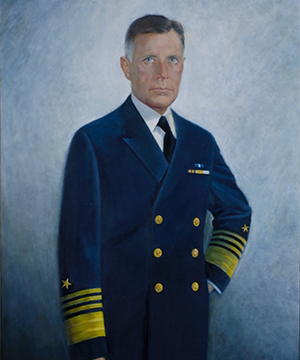
Raymond A. Spruance
Adm.
Spruance graduated from the U.S. Naval War College in 1927 and returned to serve on the faculty, first as head of correspondence courses in 1932 – 1933, then as head of tactics instruction for the junior class in 1935 – 1936, and for the senior class in 1936 – 1937. Finally, as the twenty-sixth president of the college in 1946 – 1948, Spruance lent dignity and prestige to the college as it led in educational preparations for the Cold War era. He laid the groundwork for a wide number of innovations, including a much broader curriculum, establishing academic chairs for a distinguished civilian historian and a political scientist, and what eventually would become the Naval War College Review.
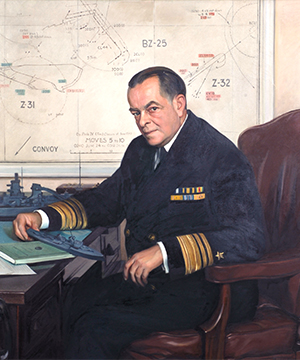
William S. Pye
Vice Adm.
William Satterlee Pye (1880 – 1957) had a long association with the U.S. Naval War College dating back to 1913 – 1915, when, as a lieutenant, he served as a member of the college staff. Among his important early contributions were mathematical tables developed from the college’s war games to assist the fleet in maneuvers. In 1920, while serving as Executive Officer of the battleship Pennsylvania (BB 38), he had been a member of the influential Knox-King-Pye Board that recommended a policy for advanced naval education. In 1934 – 1935, he attended the Naval War College as a member of the first Advanced Class.
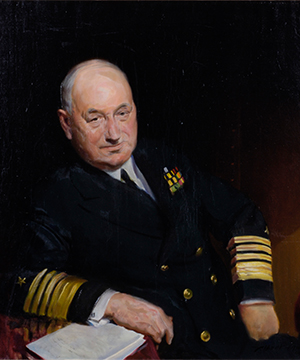
Edward C. Kalbfus
Adm.
Edward Kalbfus (1877 – 1954) was a staunch believer in the value of the U.S. Naval War College to the service. On reassignment as the twenty-fourth college president, he reverted to his permanent rank as a rear admiral. He is best remembered for the production by the Naval War College of Sound Military Decision (1942), the only published guide for naval planning in the U.S. Navy, and for the successful efforts that he made to keep the college open during the Second World War. After leaving the War College in 1942, he became a member of the Navy’s General Board and in 1944, the first Director of Naval History. In 1944, he was a member of the three-officer Pearl Harbor Court of Enquiry.

Edward C. Kalbfus
Adm.
Edward Kalbfus (1877 – 1954) was a staunch believer in the value of the U.S. Naval War College to the service. He exerted strenuous efforts to forward the institution’s objects and to enhance its stature within the Navy Department as well as in the City of Newport, which names the main street leading from town to the college as Admiral Kalbfus Road. He graduated from the college in 1927, served two years on the staff and served two separate tours as president. On leaving the college as the twenty-second president, he was promoted to vice admiral in 1936 as Commander Battleships, Battle Force, and in 1938 to four stars as Commander Battle Force, United States Fleet.
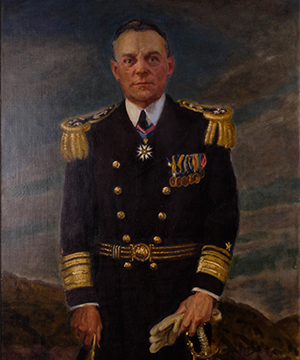
Joel Roberts Poinsett Pringle
Vice Adm.
The nineteenth president of the U.S. Naval War College, Joel R. P. Pringle (1873–1932), had been the first commanding officer of the destroyer USS Perkins (D 26) in 1910 and went on to command the destroyer tender USS Dixie (AD 1), Flotilla 2 of the Destroyer Force, Atlantic Fleet, and the battleship USS Idaho (BB 24). During World War One, he was simultaneously Chief of Staff, Destroyer Flotilla, European Waters, and Commanding Officer of the destroyer tender USS Melville (AD 2), Admiral Sims’s flagship. He graduated from the Naval War College in 1920 and served as Chief of Staff at the Naval War College in 1923–1925 under Rear Admiral C. S. Williams.
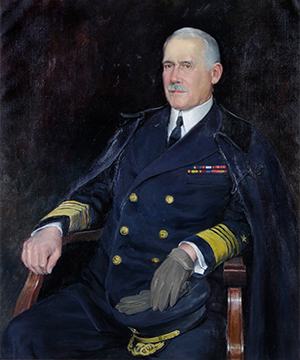
William V. Pratt
Rear Adm.
William V. Pratt (1869–1957) had served as a member of the U.S. Naval War College staff in 1911–1912. On becoming the eighteenth president in 1925, he instituted reforms that changed the focus of student education significantly for the future. Most important, he believed that naval officers should be made to view the totality of modern warfare, and expanded course requirements to include much more than tactics and strategy. Pratt eventually rose to the rank of admiral and was the first president of the Naval War College to hold the office of Chief of Naval Operations. He served in that capacity from September 1930 through June 1933, during the administration of President Herbert Hoover.
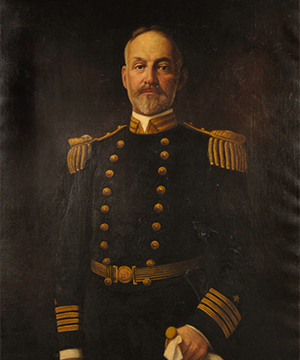
William S. Sims
Rear Adm.
Long before becoming the fifteenth president of the U.S. Naval War College, in 1917, Sims was one of the best-known officers in the Navy. In 1919, Sims returned to the college as its sixteenth president, reverting to two-star rank. While president of the college, he published his Pulitzer Prize–winning memoir, The Victory at Sea (1920), and became a major public figure through his criticism of Washington’s conduct of the naval war.

William S. Sims
Rear Adm.
Long before becoming the fifteenth president of the U.S. Naval War College, in 1917, Sims was one of the best-known officers in the Navy. As an advocate of improved naval gunnery, Inspector of Naval Ordnance, and naval aide to President Theodore Roosevelt, Sims had been an outspoken naval critic. He attended the college’s two-year Long Course in 1911 – 1912. Shortly after becoming the college’s president, Sims was ordered in late March 1917 to sail secretly for England under an assumed name to begin discussions with the Royal Navy on wartime cooperation. After the United States declared war, he stayed on and rose to four-star rank as Commander in Chief, U.S. Naval Forces, Europe.
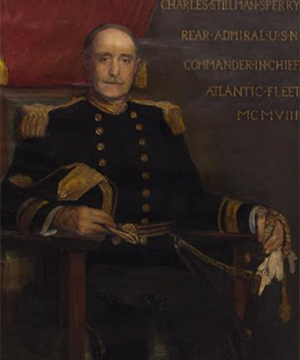
Charles S. Sperry
Capt.
Rear Admiral Charles Stillman Sperry (1847–1911) was the tenth president of the U.S. Naval War College (1903–1906) and afterward commanded the Great White Fleet on its voyage from California to Australia, New Zealand, Japan, China, across the Indian Ocean, through the Mediterranean, and across the Atlantic to Norfolk, Virginia, in 1908–1909.
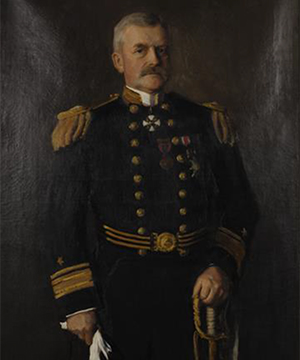
Caspar F. Goodrich
Capt.
One of the founders of the U.S. Naval War College, Lieutenant Commander Caspar Goodrich (1847–1925) served with Rear Admiral Luce and Captain William T. Sampson on the board of officers convened to consider Luce’s recommendation to establish the college in May 1884. Goodrich was Luce’s first choice to be the new college’s lecturer in naval history and tactics, but he was unavailable for the assignment. In 1886–1889, as officer in charge of the Torpedo Station in Newport, he saved the college from amalgamation with that facility. As the third president of the college, Goodrich oversaw the construction of Luce Hall.
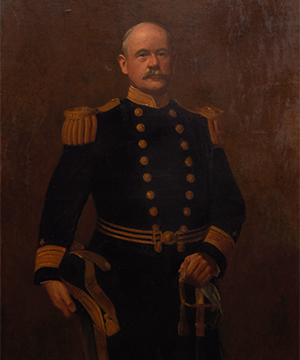
Henry C. Taylor
Capt.
Henry Clay Taylor (1845–1904) was the sixth president of the U.S. Naval War College. In 1880 – 1884, Taylor had commanded one of Admiral Luce’s training ships. Taylor clearly understood Luce’s thinking and became a lecturer to the college’s first class. During his tenure as president, Taylor revised the curriculum and established an academic program that lasted until 1919. Among his innovations were the use of case studies for instruction in international law and making war gaming part of the curriculum.
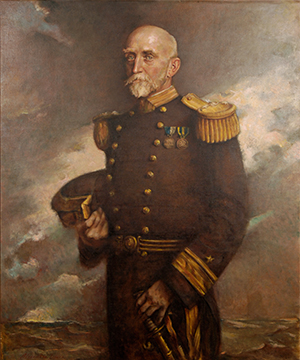
Alfred Thayer Mahan
Capt.
Alfred Thayer Mahan (1840 – 1917) served as the U.S. Naval War College’s second president in 1886 – 1889 and as its fourth president in 1892 – 1893. In 1885, Admiral Luce chose Mahan to be the college’s first instructor in naval history and tactics. In 1892, he returned with a new set of lectures to deliver: The Influence of Sea Power upon the French Revolution and Empire 1793 – 1805 (1892). These books were the first that drew international attention to the college. Later, he returned to lecture between 1895 and 1912.
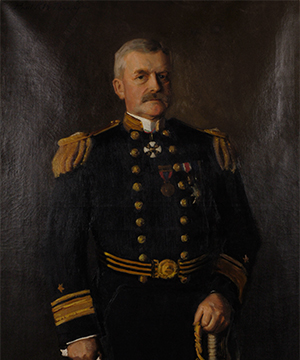
Caspar F. Goodrich
Capt.
One of the founders of the U.S. Naval War College, Lieutenant Commander Caspar Goodrich (1847–1925) served with Rear Admiral Luce and Captain William T. Sampson on the board of officers convened to consider Luce’s recommendation to establish the college in May 1884. Goodrich was Luce’s first choice to be the new college’s lecturer in naval history and tactics, but he was unavailable for the assignment. In 1886–1889, as officer in charge of the Torpedo Station in Newport, he saved the college from amalgamation with that facility.

Alfred Thayer Mahan
Capt.
Alfred Thayer Mahan (1840 – 1917) served as the U.S. Naval War College’s second president in 1886 – 1889 and as its fourth president in 1892 – 1893. In 1885, Admiral Luce chose Mahan to be the college’s first instructor in naval history and tactics. The lectures he delivered at the college in 1886 and 1887 were eventually published as The Influence of Sea Power upon History, 1660 – 1783 (1890).
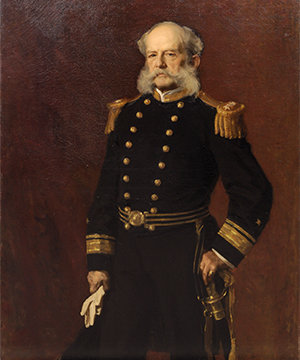
Stephen B. Luce
Rear Adm.
The U.S. Naval War College’s founder and first president, Rear Admiral Stephen B. Luce (1827–1917), is recognized by historians as the “Intellectual Leader of the ‘New Steel Navy’” that developed at the end of the nineteenth century. In that period, the U.S. Navy went through a major transformation, not only from small-to major-power status, but also from wood to steel, and sail to steam. In the midst of this transformation, it was Stephen B. Luce who was the most important figure in teaching American naval officers to think broadly about their profession and to understand the fundamental nature of naval power, noting both its capabilities and its limitations.
